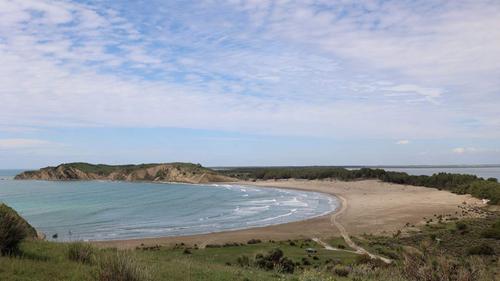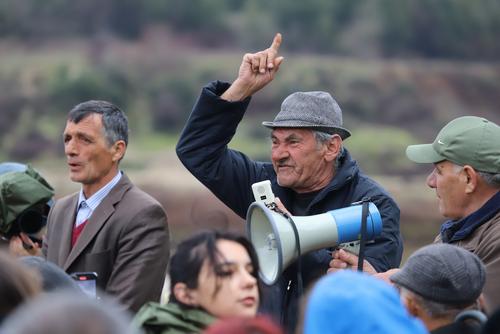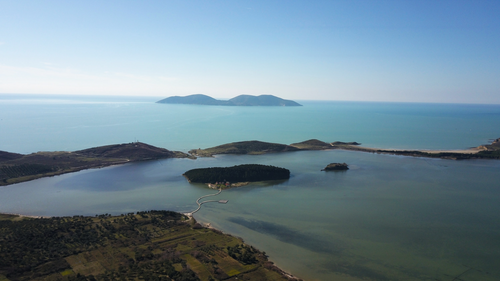Upfront the 2025 IUCN World Conservation Congress, members have overwhelmingly approved Motion 130 with more than 98 % of votes, calling for stronger restrictions on unsustainable tourism infrastructure in IUCN Category I and II protected areas.

Stretches of unspoilt coastline like this one on the Zvërnec peninsula in Albania are rare in the eastern Adriatic. However, the area is now under threat from tourism development enabled by a change in the law in 2024.
© Anika Konsek
On 24 February, the mayors and residents of the Shushica Valley protested against the Himara Water Extraction Project. The Shushica River is one of the Vjosa's main tributaries. In March 2023, the Vjosa was designated Europe's first Wild River National Park.
© Adrian Guri
A bird's-eye view of the Narta Lagoon and Sazan Island. Donald Trump's son-in-law, Jared Kushner, whose investment firm, Affinity Partners, plans to build a luxury resort covering 1,100 hectares with 6,000 hotel rooms and villas along the lagoon. A similar project is planned for the nearby, uninhabited Sazan Island, which lies within a marine national park.
© Xhemal Xherri / PPNEAThis motion was initiated by PPNEA (Albania) and co-sponsored by 14 partner organisations from 13 countries, including EuroNatur, BirdLife International, Tour du Valat, Wetlands International, and others. What started as a call from a small country like Albania, against the controversial amendments to the Law on Protected Areas (Law No. 21/2024), has now grown into a global achievement for conservation. Together, we reaffirmed a simple principle: protected areas are for conservation, not massive development, including for mass tourism.
The adoption of Law No. 21/2024 in Albania, defended under the false narrative of “following IUCN criteria,” opened the door for tourism complexes, airports, and energy facilities even in national parks. This dangerous precedent prompted the development of Motion 130 to ensure governments worldwide cannot use similar loopholes to justify the destruction of nature under the guise of tourism. The motion specifically urges the Albanian government to reinstate restrictions on heavy infrastructure development within protected areas.
This outcome also adds weight to recent calls from the European Union, which has already required Albania to restore its environmental protections as a condition for advancing EU accession (despite nature conservation concerns, EU opens negotiations with Albania on environment).
From Albania’s coastal wetlands and aged sand dunes of Vjosa–Narta, where luxury resorts and airports are planned, to similar struggles across the globe, Motion 130 is now a strong international reminder to governments that tourism is no excuse to destroy protected areas.
But while the vote is a major success, the work is not over. Without immediate action, the Albanian government may continue to pursue destructive projects in national parks, ignoring both European requirements and IUCN’s global stance.
Background information:
The International Union for Conservation of Nature (IUCN) is a global network of over 1,400 member organisations, including governments, NGOs, and scientific institutions. Ahead of the IUCN World Conservation Congress 2025, all eligible members were invited to vote online on submitted motions. These motions help define the Union’s political positions and issue recommendations to governments and international bodies. Motion 130 was adopted through this official voting process. As part of IUCN’s democratic structure, the motions process enables members to shape the global conservation agenda and respond collectively to emerging environmental challenges.


